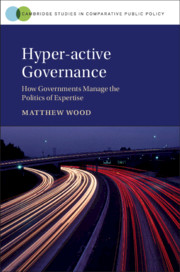Book contents
- Hyper-active Governance
- Cambridge Studies in Comparative Public Policy
- Hyper-active Governance
- Copyright page
- Contents
- Figures
- Tables
- Boxes
- Preface
- Acknowledgements
- Abbreviations
- Part I Introducing Hyper-active Governance
- Part II Hyper-active Governance in Practice
- 3 Defence
- 4 Empowerment
- 5 Inclusion
- 6 Defend, Empower and Include
- Part III Theorising Hyper-active Governance
- Book part
- Notes
- References
- Index
4 - Empowerment
Emergency Management and Flooding Governance
from Part II - Hyper-active Governance in Practice
Published online by Cambridge University Press: 21 June 2019
- Hyper-active Governance
- Cambridge Studies in Comparative Public Policy
- Hyper-active Governance
- Copyright page
- Contents
- Figures
- Tables
- Boxes
- Preface
- Acknowledgements
- Abbreviations
- Part I Introducing Hyper-active Governance
- Part II Hyper-active Governance in Practice
- 3 Defence
- 4 Empowerment
- 5 Inclusion
- 6 Defend, Empower and Include
- Part III Theorising Hyper-active Governance
- Book part
- Notes
- References
- Index
Summary
Hyper-active governance is about more than just government resisting public demands that they intervene in expert-led agencies. Often intervention is required to protect the status quo. Emergencies are a good example of this. In the event of a terrorist attack, a bush fire or a fire in a nightclub, politicians are expected to be in control of the situation. However, this does not mean that they rely any less on experts and expertise. In fact, during emergencies experts are arguably even more important. Ministers need information on the ground, expert assessments of whether things are going to get better or worse, how the situation is expected to progress and what might be done to alleviate human suffering in a highly contingent and dynamic context. They hence create emergency technocratic agencies staffed with scientists and experts in all aspects of emergency prevention, response and recovery.
- Type
- Chapter
- Information
- Hyper-active GovernanceHow Governments Manage the Politics of Expertise, pp. 107 - 138Publisher: Cambridge University PressPrint publication year: 2019

